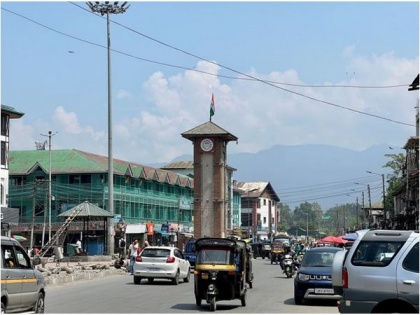Situation remains normal in valley on Syed Ali Shah Geelani's first death anniversary
By ANI | Published: September 1, 2022 11:23 PM2022-09-01T23:23:18+5:302022-09-01T23:30:08+5:30
On the occasion of the first death anniversary of Kashmiri separatist leader and former president of All Party Hurriyat Conference (APHC) Syed Ali Shah Geelani, the situation in Jammu and Kashmir remained normal on Thursday and no untoward incident was reported from anywhere.

Situation remains normal in valley on Syed Ali Shah Geelani's first death anniversary
On the occasion of the first death anniversary of Kashmiri separatist leader and former president of All Party Hurriyat Conference (APHC) Syed Ali Shah Geelani, the situation in Jammu and Kashmir remained normal on Thursday and no untoward incident was reported from anywhere.
It may be recalled that senior Hurriyat leader Syed Ali Shah Geelani passed away on September 1 last year after a prolonged illness. Following this, to keep the situation under control, the Jammu and Kashmir administration had tightened security immediately after Geelani's death and imposed closures and also closed the mobile internet facilities.
Life in the valley has been completely normal on Geelani's first death anniversary today. All the educational and government institutions remained open while the markets also saw a lot of rush as usual. Public transport has also been running normally and no untoward incident has been reported from anywhere.
A heavy deployment of police personnel was seen in Haiderpura Srinagar, the residence of Geelani. A senior police officer said, "These steps are taken as a precaution."
Geelani's death is the second major setback for the separatists in Kashmir after August 5, 2019, while some observers believe that separatism is over in Kashmir. He was a member of the Legislative Assembly of Jammu and Kashmir from the Jamaat-e-Islami and the Muslim United Front. After the outbreak of the anti-India insurgency in 1989, he renounced electoral politics and played a central role as a separatist leader.
Before his death, the authorities had kept him under house arrest for 13 years. He was detained in 2010 during Omar Abdullah's regime when he led a mass protest in Kashmir against the killing of four Kashmiri youths in an encounter that left dozens dead. However, in 2015, under Mufti Muhammad Saeed, Geelani was allowed to leave the house for a few weeks, but after raising anti-India slogans in a public meeting, he was again detained until his death.
Sometimes he had to be shifted to a hospital in Srinagar under high security for medical check-ups. Geelani was suffering from several disorders simultaneously. One of his kidneys was removed due to cancer while he underwent several heart surgeries. According to his close sources, his memory had also gone for the last two years.
In the past, he contested assembly elections on Jamaat-e-Islami ticket several times and represented Sopore constituency in the assembly for 15 years. Geelani started his politics with Jamaat-e-Islami, which is currently banned. He separated from Jamaat-e-Islami in 2003 and formed his own party called Tehreek Hurriyat, whose members were mostly affiliated with Jamaat-e-Islami.
Geelani broke away from the Hurriyat Conference as well in response to the People's Conference fielding a veiled candidate in the 2002 assembly elections and later became the head of one of its factions. He even closed the doors of his residence for a parliamentary delegation from Delhi. This parliamentary delegation had arrived in Srinagar under the leadership of then Home Minister Rajnath Singh, where the situation had gone out of control after Hizbul Mujahideen commander Burhan Wani was killed.
Although Rajnath Singh had refused to give official permission to the delegation that went to Geelani's house, the act of closing the doors to them was interpreted as a sign that Geelani did not believe in reconciliation.
His son, Nasibti Altaf Ahmad Shah, was arrested by authorities in 2017 during a wide-ranging crackdown on separatists. Altaf Shah has since been detained in Delhi's Tihar Jail for his involvement in the terror funding case.
( With inputs from ANI )
Disclaimer: This post has been auto-published from an agency feed without any modifications to the text and has not been reviewed by an editor
Open in app